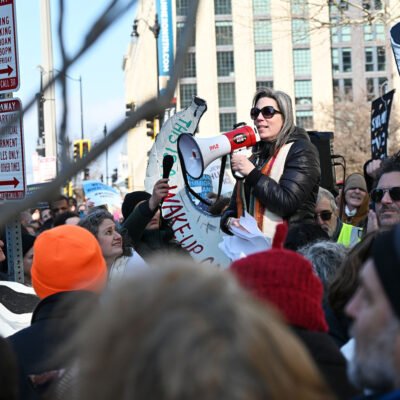(RNS) — After years of working for a Christian international relief group, sociologist and professor Kurt Ver Beek wasn’t satisfied with the tool kit available to most faith groups combating poverty. To him, mission trips, direct aid and even strategies like micro loans largely seemed aimed at targeting the symptoms of poverty, rather than its root causes.
In 1998, Ver Beek and his wife, Jo Ann Van Engen, became co-founders of La Asociación para una Sociedad más Justa (in English, the Association for a More Just Society). Based in Tegucigalpa, Honduras, the Christian nonprofit sought to understand and then dismantle the systemic barriers preventing communities in Honduras from thriving — namely gang violence, police corruption and government mismanagement.
Over the past several decades, that’s involved hiring investigators to track down gang leaders on a murder spree, working with mental health professionals to address the factors causing youths to join gangs in the first place, partnering with national religious leaders and top government officials to purge the national police force of corruption, and conducting and publishing audits on everything from the annual number of school days to how government programs used emergency funds.
In May, a new book, “Bear Witness: The Pursuit of Justice in a Violent Land,” documented the efforts of Ver Beek, his Honduran co-leader Carlos Hernández and the rest of the ASJ team as they applied their approach to risky, morally complex and highly impactful endeavors. RNS spoke to Ver Beek about the faith that’s shaped his work, how ASJ has navigated ethical dilemmas and why other nonprofits should take anti-violence work seriously. This interview has been edited for length and clarity.
What has it been like for you to encounter the story of ASJ in book form?
The book was written by an independent journalist, so we didn’t see any version until it was finished. In the end, we feel like he got, I would say, 90% right. I think he, for the purpose of the story, made it all about Carlos and I, but there’s a ton of other people. When we were purging the police, which was a very huge and scary thing, that decision was made with the head of the Protestant church and the head of the Catholic Church and the National University president. If and when there were missteps, others were involved in those decisions. There were a few negative pieces to the book, but mostly it was very positive reading about it 20 years later.
Did growing up in the Christian Reformed Church play a role in your decision to co-found ASJ, and take the risks of facing gangs and corrupt police forces head-on?
The Christian Reformed Church is of the Calvinist tradition, which teaches that we are called to transform this world. There’s a Calvinist theologian named Abraham Kuyper who said we are called to transform every square inch of this world, and that we are God’s agents of change. Being brought up in that church and shaped by education in that church is really part of my religious DNA.

Co-founder Kurt Ver Beek speaks at an Association for a More Just Society event. (Photo courtesy ASJ)
As a person of faith, how did you wrestle with the notion that you were putting violent criminals who were also young teens into inhumane prisons?
Parts of that were hard on me, probably even harder on Carlos. Carlos ran schools and summer camps in our neighborhood. One of the kids who was the most violent, who probably killed 15 to 20 people that we know of, went to one of the summer camps. He was a smart kid. Really rough family, but he was leading a gang, and was clearly the most violent member. If there’s a gang of 40, 50 kids, it’s often one or two of them that seem to enjoy it, and the rest of them follow along. So it wasn’t that hard to do what we did. If you can pull one or two people out of that group, the gang doesn’t disappear, but the violence often drops dramatically. Those were the people we were focusing on, which meant saving a bunch of other lives.
We would often talk to their moms and aunts, and they would say, he’s going to either end up in jail, or dead in the gutter somewhere, and we’d rather he was in jail. Maybe God can turn his life around. One thing we also did was to try and start a program, which is still going, for the most at-risk youth in our neighborhoods, trying to catch these kids before they got in. We’d start with kids ages 10 to 11 from those same sorts of families. For a while, we were also trying to fix up the juvenile detention center. It became problematic because we were putting kids in there, and we eventually had to stop doing that because of conflicts of interest. But we were very aware that this was not a good place for these kids, and we were trying to keep them from going down this path. We have gone back into trying to work in juvenile centers for the last four or five years, to try to make it safer.
Early on in your work at ASJ, you concluded that impoverished people needed protection from violence more than additional aid, development or evangelism. Do you think this principle is universal? Or was it specific to the situation in Honduras?
I don’t know to what extent I would universalize it, but from everything I know, I would be very tempted. When it comes to poverty, violence is still not a common issue addressed. One of the main reasons is that addressing this violence issue puts aid workers and their staff at risk. When you live with the people that you’re serving, you end up figuring out that those problems they’re addressing every day are much more complicated than you thought.
We had a woman in our neighborhood we were helping, giving her a loan to start a pillow business. Within months she had four employees, making all these pillows. And then the gang showed up. Within a month or two, they were extorting her for more than what her profits were, and threatening her and her daughter. And she just closed the shop.
In Honduras, there’s hundreds of micro enterprise organizations that are giving out millions of dollars a year. And lots of donors in the U.S. love it. But I don’t know of any other Christian organization working on violence in those same neighborhoods. I think we’re the only one. So you just see the mismatch there. It isn’t that people should stop doing micro enterprise. But I think they only address a part, and they often miss the base things people need to make that business work.
How has your faith evolved during your many years at the helm of ASJ?
I used to be very critical of the church, as a young person. I was idealistic, and didn’t see that the church was living out Jesus, especially the way I understood Jesus, as fighting for the poor and the vulnerable. And I think all this experience, with the police purge, the Protestant pastors were the powerhouse behind that. I’ve seen people of all sorts of faiths being brave. So I’m way less critical. If it’s the body of Christ, we have different callings and gifts. I have just one of those callings. So I’m more humble. I think I probably had a more individualistic idea of salvation and faith that has become more communal. And there’s a lot of discussion now about empire. I’m not a theologian, but there’s something there that makes sense to me, that we are fighting systems.
Would you still consider yourself part of the Christian Reformed Church?
The church I see right now, in the Christian Reformed Church in North America, is not a place I feel very comfortable. I think the teachings, the base theology, is all still there, but it’s become completely polarized over LGBTQ, and around a whole bunch of other issues, even women in office. One side of the church is trying to impose its will on the other, and felt, I think, to some extent, like the other side imposed their will on them years ago. It mirrors politics in the U.S. right now. It’s a very divided church. Lots of people are leaving. Many young people don’t want to go to that church. It’s a rough time in the denomination. Jo Ann and I being in Honduras, it makes us sad to see all this happening. I still resonate strongly with this idea that we are called to be agents of transformation of every square inch. But I’m very saddened by all of the inciting polarization now, which is happening in lots of other churches, too.



